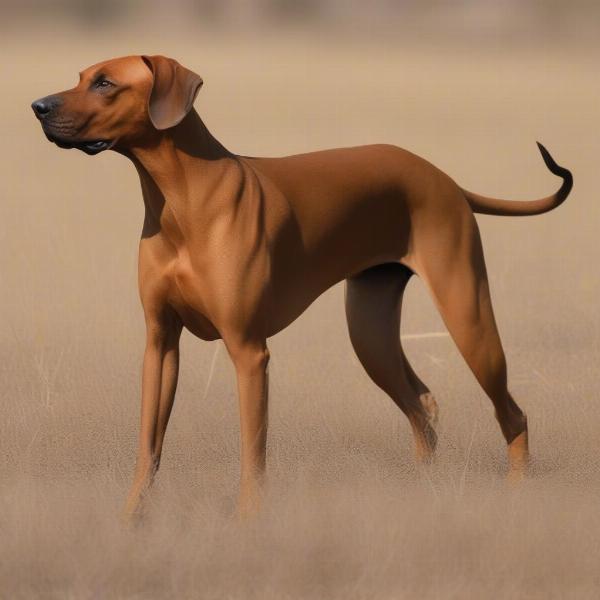The phrase “yellow and burgundy coat dog” often leads people to think of one breed in particular: the Rhodesian Ridgeback. These striking dogs are known for their short, wheaten to red-wheaten coats and the distinctive ridge of hair running along their backs. This article will explore everything you need to know about these majestic animals, from their history and temperament to their care and health requirements.
History and Origin of the Rhodesian Ridgeback
The Rhodesian Ridgeback’s history is deeply rooted in Africa, specifically Southern Rhodesia, now Zimbabwe. Developed by Boer farmers, they needed a hunting dog capable of tracking and baying large game, including lions. Hence their original name, the “African Lion Hound.” Their ridge is a genetic trait believed to originate from their Khoikhoi dog ancestors. These courageous dogs played a crucial role in protecting farms and assisting hunters in the harsh African landscape.
 Rhodesian Ridgeback Hunting in Africa
Rhodesian Ridgeback Hunting in Africa
Temperament and Personality
Rhodesian Ridgebacks are known for their loyal and affectionate nature within the family. They can be protective and wary of strangers, a trait stemming from their guarding instincts. Early socialization is crucial for Ridgebacks to develop into well-adjusted adults. While they are intelligent and eager to please, they also possess a strong independent streak, which requires consistent and patient training. They’re known to be playful and energetic, needing plenty of exercise to thrive.
Care and Health Considerations
Caring for a Rhodesian Ridgeback involves meeting their specific needs regarding exercise, nutrition, and grooming. These active dogs require significant daily exercise, whether through long walks, runs, or engaging games. Their short coat requires minimal grooming, with occasional brushing sufficient to remove loose hair. Like all breeds, Ridgebacks are prone to certain health issues, including hip and elbow dysplasia, hypothyroidism, and dermoid sinus. Regular veterinary check-ups and a healthy diet are crucial for maintaining their well-being.
Training a Rhodesian Ridgeback
Due to their independent nature, training a Rhodesian Ridgeback requires patience and consistency. Positive reinforcement methods work best, rewarding desired behaviors with praise and treats. Early socialization and obedience training are essential for shaping them into well-behaved companions. Their intelligence allows them to learn quickly, but their stubbornness can sometimes pose a challenge, highlighting the need for a firm yet gentle approach.
Is a Rhodesian Ridgeback Right for You?
Bringing a Rhodesian Ridgeback into your life is a significant decision. Their unique needs and strong personality require a committed owner who can provide them with the necessary exercise, training, and attention. If you’re an active individual or family ready to dedicate time and effort to a loyal and intelligent companion, the Rhodesian Ridgeback might be the perfect breed for you.
Conclusion
The Rhodesian Ridgeback, with its striking yellow and burgundy coat, is a breed that embodies strength, loyalty, and a touch of independence. From their origins as lion hounds in Africa to their current role as beloved family companions, they continue to captivate with their unique characteristics. By understanding their history, temperament, and specific care needs, potential owners can make informed decisions and embark on a rewarding journey with this remarkable breed.
FAQ
- Are Rhodesian Ridgebacks good with children? While they can be affectionate with family children, early socialization and supervision are essential, especially with younger children.
- How much exercise does a Rhodesian Ridgeback need? They require a significant amount of daily exercise, at least an hour of vigorous activity.
- Are Rhodesian Ridgebacks easy to train? Their intelligence allows them to learn quickly, but their independent nature requires patience and consistency.
- What health problems are common in Rhodesian Ridgebacks? Common issues include hip and elbow dysplasia, hypothyroidism, and dermoid sinus.
- What is the lifespan of a Rhodesian Ridgeback? Their average lifespan is 10-12 years.
- Do Rhodesian Ridgebacks bark a lot? They are not known for excessive barking, but will bark to alert their owners.
- What is the significance of the ridge on their back? The ridge is a genetic trait believed to have originated from their Khoikhoi dog ancestors.
Related Articles on ILM Dog
(If applicable, add links to relevant articles on the ILM Dog website. Examples: Rhodesian Ridgeback Breed Profile, Large Dog Breeds, Dog Training Tips, Understanding Dog Health)
About ILM Dog
ILM Dog (https://ilmdog.com) is your go-to resource for expert advice on dog care and breeding. We offer comprehensive guides on breed selection, health and medical care, training, nutrition, grooming, exercise, puppy care, senior dog care, traveling with dogs, and product recommendations. Our team of experienced writers and dog experts is dedicated to providing accurate and practical information for dog owners worldwide. Whether you’re a first-time dog owner or a seasoned expert, ILM Dog can help you provide the best possible care for your furry companion. Contact us at [email protected] or +44 20-3965-8624 for personalized guidance.